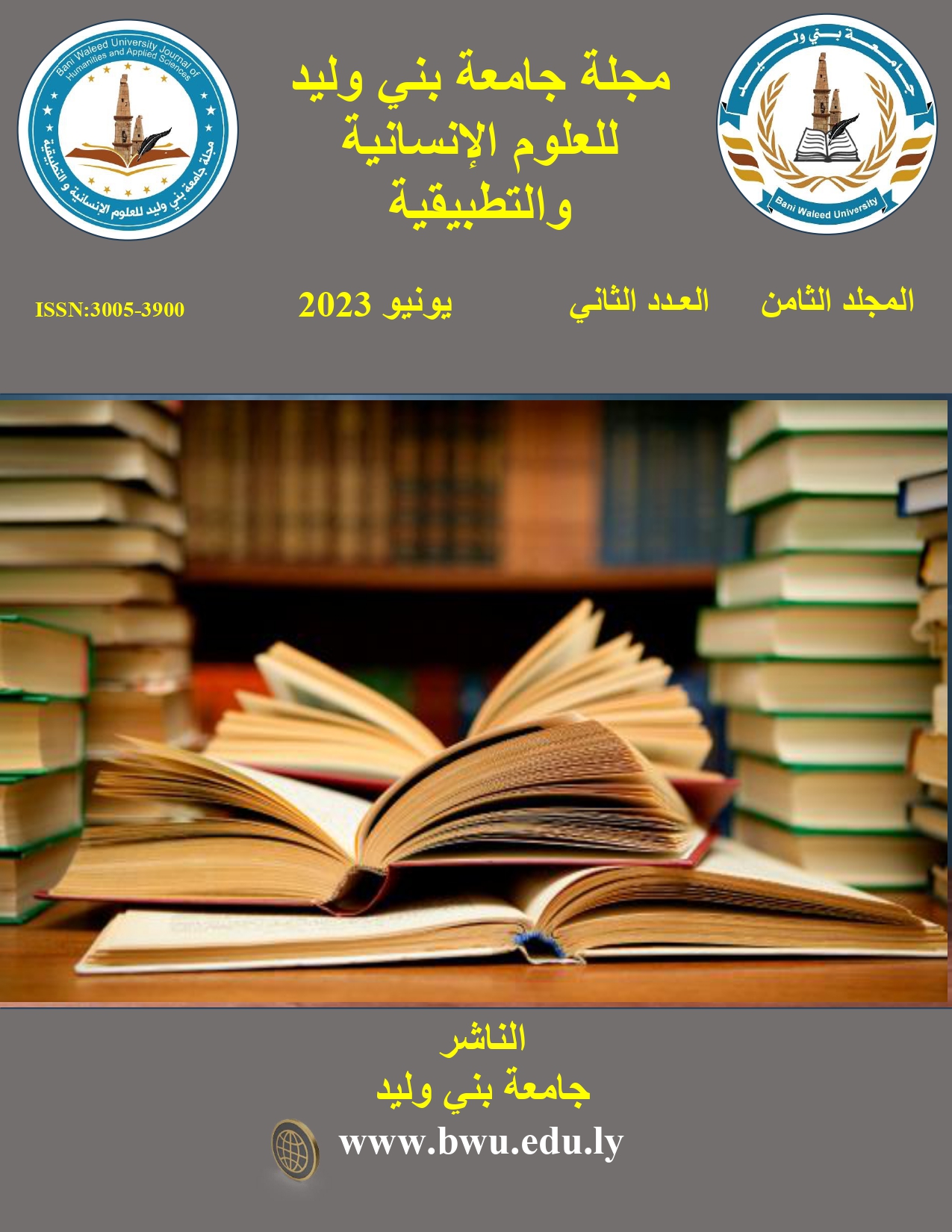Improving the Academic Writing Essays of EFL Libyan Students: Observational Case Study on the Faculty of Languages and Translation at Al-Zytuna University
DOI:
https://doi.org/10.58916/jhas.v8i2.486الكلمات المفتاحية:
Academic writing, EFL students, Writing skills, Classroom observations, Essay analysisالملخص
This observational case study focused on improving the academic writing essays of Libyan students in the English department on the Faculty of Languages and Translation at Al-Zytuna University. The study aimed to investigate the difficulties and problems that students face in academic writing and to suggest ways to improve their writing skills. The study used qualitative data collection methods, including classroom observations and essay writing analysis. The findings of the study showed that students encountered difficulties in information collection, idea organization, and communication. They also lacked knowledge of different types of essays, paragraph organization, and coherence. The study provides implications for academic writing instruction and highlights the need for further research with a larger group of students.
التنزيلات
المراجع
- Alnefaie, M., (2023). Comparison Study: The Impact of Lecturer’s Feedback on EFL Students’ Essays: International Education Studies; 16, 139 – 206.
- Al-Kufaishi, S., & Al-Mahdawi, S. (2019). The relationship between language proficiency and writing performance: A case study of Iraqi EFL students. International Journal of Instruction, 12(1), 817-832.
- Badger, R., & White, G. (2000). A process genre approach to teaching writing. ELT journal, 54(2), 153-160.
- Cheng, J. H., Cheng, Y. S., & Wang, Y. J. (2016). The effect of online peer feedback on EFL students’ writing performance. Journal of Educational Technology & Society, 19(4), 192-204.
- Cheng, X., & Zhang, L. J. (2021). Teacher written feedback on English as a foreign language learners’ writing: Examining native and nonnative English-speaking teachers’ practices in feedback provision. Frontiers in Psychology, 12, 629921.
- Creswell, J. W. (2013). Qualitative inquiry and research design: Choosing among five approaches. Sage publications.
- Dema, K. (2020). Problems in Students’ Academic Writing. Journal of Education and Practice, (11) 18, 34-40.
- Hamp-Lyons, L., & Heasley, B. (2006). Study writing: A course in written English for academic purposes. Cambridge University Press.
- Hyland, K. (2003). Second language writing. Cambridge University Press.
- Kuo, I. C. (2014). Effects of a genre-based approach on writing development in an EFL context. Journal of Second Language Writing, 25, 55-69.
- Lee, I. (2010). Research into practice: Written corrective feedback. Language Teaching, 43(3), 391-410.
- Li, L., & Zhu, W. (2020). Written corrective feedback: A meta-analysis of its effects on L2 writing. Journal of Second Language Writing, 49, 100787.
- Merriam, S. B., & Tisdell, E. J. (2015). Qualitative research: A guide to design and implementation. John Wiley & Sons.
- Miles, M. B., Huberman, A. M., & Saldana, J. (2013). Qualitative data analysis: A methods sourcebook. Sage publications
- Nenotek ,S. A., Tlonaen., Z. A., & Manubulu., H. A. (2022) .Exploring University Students’ Difficulties in Writing English Academic Essay. Al-Ishlah: Journal of Pendidikan.14, 909-920.
- Paltridge, B., & Starfield, S. (Eds.). (2013). The handbook of English for specific purposes. John Wiley & Sons.
- Peng, J. E., & Zhang, L. J. (2021). The effect of L1 use on L2 writing: A meta-analysis. Journal of Second Language Writing, 52, 100745.
- Straub, R. (1997). Students' reactions to teacher comments: An exploratory study. Research in the Teaching of English, 91-119.
- Swales, J. M., & Feak, C. B. (2012). Academic writing for graduate students: Essential tasks and skills. University of Michigan Press.
- Yusof, J., Ab Manan, N. A., & Alias, A. A. (2012). Guided peer feedback on academic writing tasks using Facebook notes: An exploratory study. Procedia-Social and Behavioral Sciences, 67, 216-228













